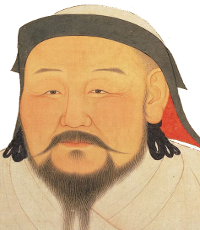Dreams of the emperor’s palace
One day in October 1797, the English poet Samuel Taylor Coleridge took a few grains of laudanum – an opium-based extract used as medicine – and sat down to read Purchas His Pilgrimage, a collection of classical travelers’ tales. One of the most famous entries in the book was Marco Polo’s description of the palace of Kublai Khan in Shangdu in Inner Mongolia. “In Xanadu,” Polo remembered, “did Cublai Can build a stately palace, encompassing sixteen miles of plain ground with a wall, wherein are fertile meadows, pleasant springs, delightful streams, and all sorts of beast and chase and game, and in the middle thereof a sumptuous house of pleasure, which may be removed from place to place.” Soon Coleridge fell asleep. In his sleep he had a vision of Kublai Khan’s palace. It was a sublime apparition, Coleridge explained when he eventually woke up, which inspired both longing and dread:
In Xanadu did Kubla Khan
a stately pleasure-dome decree,
where Alph, the sacred river, ran
through caverns measureless to man
down to a sunless sea. …
A savage place! As holy and enchanted
as a’er beneath a waning moon was haunted
by woman wailing for her demon lover. …
A story missing from Purchas’ collection was the account of Kublai Khan’s palace written by the Persian fourteenth-century historian Rashid-al-Din Hamadani. Here too a dream features prominently. In Rashid-al-Din’s version, however, it is the emperor who does the dreaming. Kublai Khan, we are told, had a dream of a magnificent palace. When he woke up he promptly instructed his architects to construct a similar building and before long the palace in Shangdu was completed. This was the palace which Marco Polo later came to visit.
Curiously, the palace first appeared in a dream, both to the English poet and to Kublai Khan himself. Even more curiously, Coleridge could not have been influenced by Rashid-al-Din’s account since it was translated into European languages only in the nineteenth-century. It is the palace which we see in our dreams which is real and eternal, we can conclude, whereas the palaces which from time to time are created here on earth only are its ephemeral copies. In the future, another ruler or a poet will dream about it again, and it will once again come to appear on earth.

